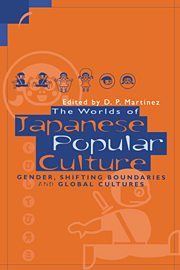Chapter 7 - Nonchan's Dream
NHK morning serialized television novels
Published online by Cambridge University Press: 22 September 2009
Summary
Introduction
Contemplating a society through the window of its artistic productions is an activity fraught with peril: there will always be distortion, for art is necessarily a selective representation of society and its multiple ideologies. This is as true of sixteenth-century England viewed through the glass of Shakespeare, as it is of the United States distorted in the mirror of Dallas, or more recently, in the soap opera parody Twin Peaks. Morning serialized television novels (Asa no renzoku terebi shôsetsu, hereafter “morning dramas” or asadora) are no exception to this. However, for various reasons connected with the genre, production methods, the nature of its audience (in large part women), and NHK's own agenda, this form of television drama is a revealing instance of the contradictory ideologies that go into making modern Japan.
In a nutshell, the dramas proclaim an ideology of “social progress” with regard to the status of women: promoting the ideal of women working outside the home, but at the same time holding up for emulation traditional values such as filial loyalty and self-sacrifice. A complex negotiation can be seen to be taking place between this rhetoric of progress and the stipulations of Japanese tradition.
- Type
- Chapter
- Information
- The Worlds of Japanese Popular CultureGender, Shifting Boundaries and Global Cultures, pp. 133 - 152Publisher: Cambridge University PressPrint publication year: 1998
- 8
- Cited by

